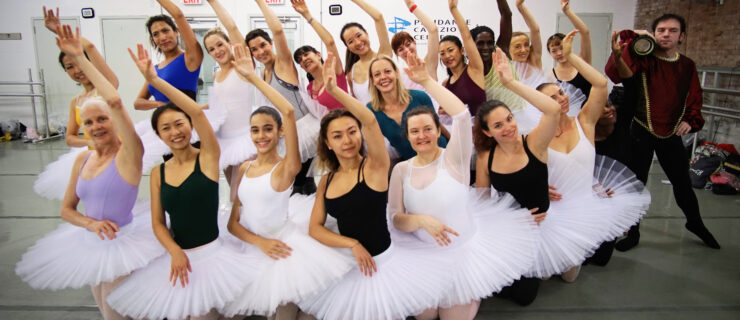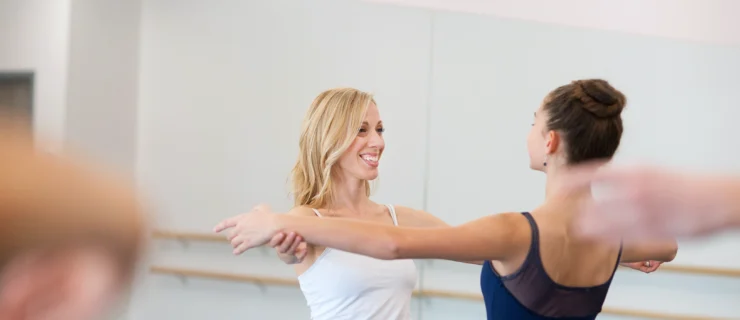"They Hate Me!" Debunking Summer Study Audition Myths
When Lilliana Hagerman auditioned for Orlando Ballet School’s summer intensive, she felt overwhelmingly intimidated. “The other dancers were all so beautiful,” remembers Hagerman, now a dancer with Kansas City Ballet. “I thought that if I made one mistake it would be over.” Hagerman did make a mistake: She slipped and fell during grand allégro. “I got back up and I smiled,” she says. To her relief, the teacher smiled back.
Summer intensive auditions give you only a few moments to make a good impression—often while crammed into a crowded room, after traveling distances in the car and with little time or space to warm up. It’s hard not to obsess over a small mistake or feel discouraged if you’re put on the intensive’s waitlist afterwards. But according to school directors, many of your fears are overreactions. Here are a few of the most common audition misconceptions, along with what’s really going on inside the teachers’ heads.
Every mistake counts against me.
Not so. Ballet Austin Academy director Bill Piner notes that he doesn’t judge auditioning students with a simple checklist. (Double pirouette? Check. Leg above 90 degrees? Check.) While he is interested in a dancer’s technical abilities, he is also looking at their potential. “We like to see how they approach their classwork,” he says. “How thoughtful are they? How quickly are they able to take information and corrections and apply them?”
After Hagerman fell in her audition in Orlando, she was still accepted. She attended the summer program for several years, eventually becoming an Orlando Ballet trainee, second-company member and then a full-company member before accepting her contract with Kansas City Ballet. For her, the smile she exchanged with the teacher as she got up was key. “How you recover from a mistake is very important,” she says. “If you get back up and just keep pushing forward, they see that.” Even professional dancers at the height of their careers make mistakes. How you handle them is as crucial as good technique and facility.
 Bill Piner. Photo by Anne Marie Bloodgood, Courtesy Ballet Austin.
Bill Piner. Photo by Anne Marie Bloodgood, Courtesy Ballet Austin.
If I ask a question, I’ll look stupid.
“It is always okay to ask a question, as long as it is relevant to the combination that we are doing,” says Pittsburgh Ballet Theatre School co-director Marjorie Grundvig. “We would rather you ask a question and be secure about what you are going to do than feel insecure.” The key here is that your question be applicable, necessary and thoughtful. Make sure that the auditioner is in fact finished setting the combination before you ask, and only ask a question about the specific combination you are working on.
Hagerman points out that in company class she often skips asking a question if she isn’t in the first group and easily gets the answer by watching the dancers before her to avoid slowing the class down. In an audition, however, your number may require you to dance in one of the first groups. In that case, it is absolutely better to ask than make a mistake. “You should feel comfortable doing that because if one person has a question about it, then usually others do, too,” says Piner. Be specific. Instead of asking the teacher to show the whole combination again, ask for clarification on the specific arm you are confused about.
The teacher wasn’t looking at me, so I’m not getting in.
Auditions can have a hundred or more participants depending on the city. The audition staff has the very daunting task of assessing every single one of those dancers. “Sometimes I will go in and see some really strong dancers and I know that they would do well here,” says Piner. “So I don’t necessarily need to continue watching them. I need to make sure that I am spending more time on the students that are a little more borderline.” Don’t waste your energy trying to interpret what the teacher is thinking. Focus completely on doing your best work.
Being wait-listed means they don’t really want me.
“When someone is wait-listed it means that we can only accept so many people into the program,” says Grundvig. “It doesn’t mean that we don’t like you. It just means that right now we have to wait and see.” Piner also explains that who lands on the waitlist varies dramatically from year to year depending on how many other dancers have auditioned and their level of talent. It can be harder to get into a school one year than it was the summer before. Equally important, understand that dancers get into programs off of the waitlist all the time. And once you’re in, it really doesn’t matter how you got there.
I didn’t get in this year, so I’ll never get in.
This is absolutely false. “I don’t want anyone to ever be discouraged to never audition again,” says Piner. When dancers audition, “I look in front of me and I make my judgments based on what I see that day,” he says. Hard-working young dancers can improve dramatically over the course of a single year. Piner advises students to enter each audition as if it were the first time they’ve tried out for that school. What happened last year doesn’t matter anymore, even for the people who previously got in. “We don’t sit there and reflect back to what we saw before,” Grundvig adds.
Don’t allow misconceptions to get in the way of a great audition, or deter you from trying again. Focus on what you can control after you pin the number on your leotard—dancing your very best. And if you don’t get in, there is always another program, and another year. “Auditioning is a skill like anything else,” says Piner. “The more you do it, the better you get at it.”






